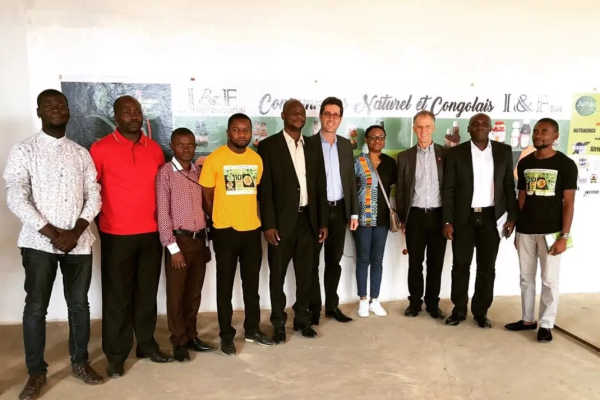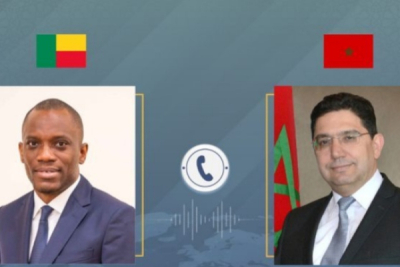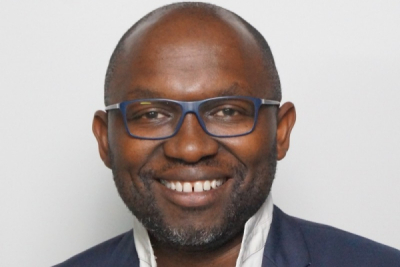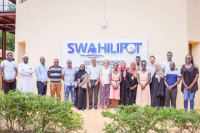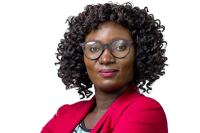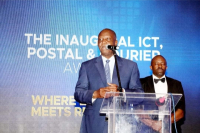For over 15 years, I&F Entrepreneuriat has been helping entrepreneurs with innovative business ideas through the business creation process. Through its programs and activities, it has supported over 1,000 entrepreneurs.
I&F Entrepreneuriat, established in 2007 with collaborative guidance from the Institut de la Francophonie pour l'Entrepreneuriat (Mauritius), the University of Bordeaux (France), and Incubateur régional d'Aquitaine (France), is a dedicated organization supporting entrepreneurs in the Democratic Republic of Congo.
Currently led by Val Masamba, an entrepreneur with decades of experience, the organization's core activities encompass training, incubation, mentoring, and financing of innovative projects designed to have a substantial social impact. Boasting over 15 years of experience, I&F Entrepreneuriat has successfully incubated 1,456 companies, including 803 initiated by individuals under the age of 35, with 39% being young women. These companies operate across diverse sectors such as agribusiness, high technology, building materials production, and information and communication technologies.
"I&F Entrepreneuriat is dedicated to the transfer of technology and aims to foster the promotion and development of a systematic approach to detecting, evaluating, economically validating, and supporting both innovative business startups and existing companies—whether or not they are linked to scientific research. This mission is carried out within the framework of a collaborative incubation and incubator structure," the organization explains on its website.
Its incubation program spans 12 to 18 months, adapting to the unique progress of each project. It opens its doors to aspiring entrepreneurs, providing them with physical and legal accommodation, comprehensive support, coaching and mentoring, entrepreneurial and managerial training, and ongoing refinement courses. I&F Entrepreneuriat aids entrepreneurs in constructing their business models and plans, integrates them into business networks and offers post-creation follow-up.
In the post-creation phase, I&F Entrepreneuriat extends its support through a comprehensive incubator. This phase assists new entrepreneurs in setting up and launching their businesses, conducting initial recruitment, establishing relationships with customers and suppliers, managing accounting, negotiating with market players, overseeing bank accounts, participating in trade fairs and conferences for product promotion, and implementing effective marketing strategies.
Finally, I&F Entrepreneuriat's incubation journey culminates in an industrial district designed specifically for small and medium-sized businesses (SMBs). This environment serves as a springboard for incubated entrepreneurs, providing them with the resources and infrastructure needed to thrive. From shared workspace and production facilities to mentorship programs and networking opportunities, the district fosters collaboration and growth, ultimately leading to high-impact, sustainable businesses that empower DR Congo.
Melchior Koba
Following a successful partnership with a South African education technology startup last November, Tanzanian authorities are doubling down on their commitment to educational innovation by collaborating with a Ugandan firm.
On Tuesday, December 12, Ugandan technology firm HiPipo announced a partnership with the Tanzanian Information and Communication Technology Commission (TCIC) to accelerate financial and digital inclusion in the country. This collaboration will be powered by HiPipo's renowned "Include Everyone" program, aimed at fostering fintech innovation, empowering women in the sector, and attracting investments in the ICT industry.
"We are ecstatic to officially announce that a pivotal agreement has been signed and sealed between HiPipo and ICTC. This promising collaboration is aimed at expediting financial inclusion in Tanzania, under the renowned HiPipo Include Everyone Program, with the generous backing of the Bill & Melinda Gates Foundation," reads a post on the LinkedIn page of HiPipo’s CEO, Innocent Kawooya (photo, left).
“The Include Everyone program activities operated globally by HiPipo will play a crucial role in promoting financial inclusion, driving economic growth, fostering ICT investment, advising stakeholders, and building a resilient, knowledgeable group of Digital Innovation and ICT Professionals in Tanzania,” the post continues.
While lagging behind some regional counterparts like Kenya and Rwanda in digital advancement, Tanzania has recently embarked on a journey to bridge the gap. It has multiplied partnerships with various countries, organizations, and startups to accelerate its digital transformation. Earlier this month, authorities announced the upcoming launch, in 2024, of a national framework for the digital economy. In the education sector, the country has also teamed up with South African startup Snapplify to improve the availability and quality of educational resources for students in Tanzania over the next three years.
Adoni Conrad Quenum
Following a phone call on Tuesday, December 12, between Benin's Minister of Foreign Affairs, Olushegun Adjadi Bakari, and his Moroccan peer Nasser Bourita, Morocco has announced that Benin is now eligible for its e-visa program. The decision will become effective on January 1, 2024
His career in the pharmaceutical industry has given him valuable expertise in health economics. In 2019, he founded an app to facilitate access to healthcare for disadvantaged people in Africa.
Brice Kitio Dschassi (photo) is a pharmacist and health economist with over 15 years of experience. He is the founder and CEO of WiiQare, a Congolese startup whose mission is to improve access to healthcare for people in Africa by connecting healthcare providers, patients, and payers.
Established in 2020, WiiQare is an innovative loyalty and rewards-based health savings and payment solution that empowers individuals to take control of their healthcare with fun and easy ways to build health savings and provides hospitals with a seamless way to receive payments from patients.
WiiQare aims to meet the needs of populations who lack access to social coverage or health insurance, or who face financial difficulties in accessing healthcare. The platform also reduces the risk of corruption or misappropriation of funds sent by expatriates.
Dschassi holds a doctorate in pharmacy from Claude Bernard Lyon 1 University (2001) and a master's degree in pharmaco-epidemiology and pharmacovigilance from Bordeaux University (2005). He is also a graduate of Université Paris-Sud, where he obtained a Master's degree in Public Health (MPH) specializing in methodology and statistics in 2005.
Between 2005 and 2009, he was a lecturer in pharmaco-epidemiology at Université Claude Bernard Lyon 1, and project manager for the Haute autorité de santé, an independent French public scientific authority that promotes quality in the health, social, and medico-social sectors. In 2009, he joined the pharmaceutical company Sanofi, where he worked for six years. In 2016, he became Lundbeck's Director of Global Health Economics and Outcomes Research. Lundbeck is a pharmaceutical company specializing in brain diseases.
Melchior Koba
The digitization of the healthcare sector is now essential to facilitate patient care and increase efficiency. With the significant resources required for this transformation, African countries are increasingly seeking strategic partnerships to support their digitalization efforts.
American bilateral aid agency The Millennium Challenge Corporation (MCC) announced, last Monday, its commitment to assisting Lesotho in establishing a national digital health system. This initiative, commencing in early 2024, aims to significantly improve the nation's ability to track and manage the health of its citizens, particularly those affected by HIV/AIDS, malaria, and tuberculosis.
"MCC will be making major investments in primary health care equipment and digital health infrastructure, beginning in early 2024. We are also planning for a health data and innovation incubator to create public demand for quality health data. [...] MCC is planning to work with the Ministry of Health to design and implement a fully operational digital health system, across all disease areas, building from the foundation established by PEPFAR– President’s Emergency Fund for AIDs Relief," explains the MCC in a blog post.
The digitization of Lesotho's national health system is a direct outcome of the effective digitization of data from the PEPFAR project. Launched in 2003 and reauthorized in 2018, this initiative received financial backing from both the United States and the Global Fund to End AIDS, Tuberculosis, and Malaria. Originally designed to cater uniquely to pregnant women with HIV, PEPFAR has significantly enhanced clinical monitoring capabilities, facilitating real-time updates of crucial data.
Adoni Conrad Quenum
VTC drivers face a growing threat of violence, including attempted kidnappings, sexual and gender-based violence, assaults, and even murders. This escalating situation has forced mobility startup leaders to take decisive action in an attempt to curb these increasingly recurrent acts.
Estonian mobility startup Bolt has introduced a new feature in South Africa designed to enhance driver safety and trust on its platform. Effective immediately, Bolt customers will be required to upload a clear image of themselves or a selfie clearly showing their face, along with a copy of their ID for verification.
"At Bolt, we know from our 150M+ customers and network of 3.5 million fleet, driver, and courier partners that feeling safe is a critical part of a high-quality ride-hailing experience. That’s why safety is our top priority, and rider verification is the newest feature we’re testing dedicated to upgrading driver safety," explains Takura Malaba, Bolt Regional Director in East and Southern Africa.
Bolt's new passenger verification feature reflects its ongoing investment in safety and its commitment to address driver concerns. This initiative follows numerous nationwide protests by drivers, urging government intervention in the face of increasing criminal incidents, including the tragic October murder of a driver in Westernburg.
The driver verification feature joins a suite of existing safety features on the Bolt app. This includes the emergency service, which allows drivers to share their details and location with the Automobile Association's contact center. Upon receiving a report, the app immediately deploys private security and emergency services.
Samira Njoya
Since its inception, the hub has been committed to enabling young people to unleash their full potential through a variety of programs. It provides a supportive community space that enables young people to meet, network, and learn, among other things.
Founded in 2016 by Mahmoud Noor, Swahilipot Hub began as a Kenyan non-profit focused on technology and innovation. In 2017, it expanded its mission to include art, becoming the Swahilipot Hub Foundation and amplifying its impact on young people's lives.
Swahilipot Hub Foundation equips young people with the tools they need to thrive in the digital age. Its Data and Research program trains participants in data collection and analysis, while other programs enhance digital skills and enable young people to navigate the ever-evolving digital landscape.
Through its Industry Attachment program, participants gain practical experience in areas such as web development, networking, and soft skills such as working with young people and effective communication.
Its enterprise program, known as "Pitching Thursday", provides a platform for young people to present their ideas and projects, gaining valuable feedback and visibility. This program serves as a springboard for growth and development. The hub also provides a unique space where young artists and technologists can build sustainable projects. In 2018, it hosted the first edition of Pwani Innovation Week (PIW), its activity focused on promoting technology. The organization also launched a heritage event in 2022. Named Modern Heritage of Africa (MoHoA) and organized in a hybrid format (face-to-face and virtual workshop), the event brought together speakers and participants from all over the world.
To date, it has trained over 100 young people in data collection and analysis, and over 150 young people have acquired digital skills. It has supported more than 10 businesses to date, helping them on their entrepreneurial journey.
Earlier in 2023, the organization was certified as the equivalent of a certified public charity in the United States of America. This means it can be directly funded by US grant-making bodies.
Melchior Koba
Following the closure of its Ugandan subsidiary in April 2023, Copia Global is now doubling down on its presence in Kenya. This strategic shift is marked by the announcement of a partnership with an American financial services giant.
Kenyan e-commerce platform Copia Global announced, on Tuesday, December 12, a 5-year partnership with American financial services giant Visa. This collaboration aims to facilitate commercial transactions on the platform and provide customers with access to a wider range of financial services.
This partnership empowers Copia's Kenyan customers to seamlessly buy and pay directly on the platform, save money through their e-wallet, access convenient borrowing options, and utilize deferred payment services. Additionally, members of the Kenyan diaspora can easily top up their loved ones' Copia e-wallets in just a few clicks via Visa.
"Copia’s network of customers, agents, and delivery sub-contractors will benefit from Visa’s capabilities on contactless payments, remittances, and loyalty solutions," said Eva Ngigi-Sarwari (photo, left), Visa Kenya Country Manager.
Founded in 2013 by Crispin Murira, Tracey Turner, and Jonathan Lewis, Copia Global has already secured over $100 million in funding to fuel its expansion. As of March 2023, the Kenyan e-commerce platform boasted a network of over 40,000 digital agents and nearly 2 million customers. Despite closing its Ugandan operations in April 2023, Copia Global continues to demonstrate consistent growth and solidify its position within the Kenyan market. This strategic partnership with Visa marks a significant step in this ongoing process, potentially paving the way for future investments in the world of financial technologies.
"The partnership and rapid digitization of customers creates a huge opportunity for Copia and Visa to bank the unbanked with previously inaccessible financial services, solving financial inclusion for the mass market in Africa," said Evelyn Wangari, Director of Financial Services at Copia Global.
Adoni Conrad Quenum
A leader in healthcare innovation across Africa, she leverages her company Kaaro Health to bridge the urban-rural healthcare gap, ensuring access to quality care for underserved communities.
Angella Kyomugisha (photo) is a social entrepreneur and financial management specialist dedicated to enhancing healthcare accessibility in rural Africa. A graduate of Kyambogo University, where she earned her bachelor's degree in economics and statistics in 2013, she serves as the co-founder, co-CEO, and CFO of Kaaro Health.
Her entrepreneurial journey was motivated by a harrowing experience during which she nearly lost her life and that of her prematurely born baby. This incident revealed the stark health disparities faced by rural women in Uganda, prompting Kyomugisha to establish Kaaro Health.
Reflecting on her experience earlier this year, she stated, "My baby and I spent three months fighting for our lives. In short, we survived, but it was really traumatic. I didn't understand what women who live in rural areas go through."
Founded in 2014, Kaaro Health pioneers the use of "container clinics," equipped with solar power, laboratory facilities, and an Internet connection, serving as telehealth centers for villages lacking clinics within a 25 km radius.
Beyond healthcare provision, Kaaro Health offers targeted financial management training to both current and potential customers, empowering them with the skills necessary to develop and sustain their businesses. The organization's goal is to support medical entrepreneurs and their SMEs in delivering increasingly sophisticated healthcare to rural and peri-urban communities.
In addition to her role at Kaaro Health, Kyomugisha serves as a board member of the Delight Children's Health Rights Initiative, a non-governmental organization dedicated to safeguarding the rights of mothers and children. Prior to her entrepreneurial endeavors, she held positions such as banking mission manager at Centenary Bank (2013-2014), project manager for Smart Telecom (2014), and fundraising manager for the Forum for African Women Educationalists (2015).
Angella Kyomugisha received the Women Empowerment Award from the Bayer Foundation in 2021. She was selected as one of the Cartier Women's Initiative Fellows in 2023. These awards underscore her commitment to driving positive change and making healthcare more accessible across the continent.
Melchior Koba
In a strategic move to accelerate its digital transformation, the Zambian government has embarked on an ambitious project to provide nationwide access to broadband internet. This initiative aims to empower citizens and unlock significant job creation opportunities through increased participation in the digital economy.
The Zambian government will phase out 2G technology entirely and shift focus towards 4th and 5th generation (4G and 5G) networks, Minister of Technology and Science, Felix Mutati, announced during the inaugural ICT, Post and Courier Awards on December 9th.
“We are eliminating 2G because we want all towers to be internet enabled. Every tower from now on will only be 4G and upwards internet enabled. We must use ICT as an enabler to deliver change to the people of Zambia,” he said.
Indeed, over the past two years, Zambia has stepped up initiatives aimed at creating a favorable environment for improving connectivity in the country. In June, an operating license was granted to Starlink, a subsidiary of the US company SpaceX, to provide satellite Internet services throughout the country, including areas previously considered inaccessible.
Telecom operators such as Airtel and MTN have also launched the commercialization of 5G in the country. Initially, the service was concentrated in specific areas, such as densely populated residential areas, shopping malls, hospitals, city centers, and central business districts.
All these initiatives have improved Internet access in the country. According to the Minister, Internet penetration has risen to 58% this year, compared with around 53% last year. The Post Office's business grew by 70% this year.
By focusing on 4G and 5G, Zambia aims to ensure greater digital access for the population, create jobs, and attract and retain investment in the ICT sector over the next few years.
Samira Njoya
More...
Artificial intelligence (AI) is rapidly becoming an integral tool across diverse domains, including the military. Military forces are actively exploring and implementing AI solutions to enhance their capabilities and operational effectiveness in various areas.
The United States commits to supporting Nigeria's use of artificial intelligence (AI) in the fight against terrorism within its borders. The support was announced during a press conference held in Abuja, Nigeria, on December 7th by Paul Dean, Principal Deputy Assistant Secretary of the US Office of Arms Control, Deterrence and Stability.
"We want to encourage the positive applications of artificial intelligence in the military. This initiative we launched with our partners just last month is centered around achieving just that: maximizing the tremendous value of artificial intelligence in military applications [While] at the same time, ensuring the international community has coalesced around a series of norms of responsible behavior to make sure that we are reducing the risk of unintended consequences or negative applications," said Paul Dean.
This US commitment comes at a critical juncture for the Nigerian military. Recent criticisms have arisen following a drone strike in Kaduna State that resulted in the deaths of approximately 100 civilians. While acknowledging the need for safeguards surrounding AI deployment in the military sector, the US views itself as a crucial ally for Nigeria in its counter-terrorism efforts. To this end, it is essential to support the use of AI, which could have prevented the obvious error in the Kaduna State tragedy. In the north of the country, Abuja has been facing several terrorist groups, particularly Boko Haram, for many years.
"...We are convinced that when states commit themselves to using this technology in a predictable, transparent, stable, and responsible way, the international community will be in the position of maximizing the advantages while reducing the risks of an irresponsible approach," the U.S. official added.
Adoni Conrad Quenum
In Africa, agriculture plays a critical role in driving economic development, social stability, and food security. Recognizing its importance, organizations like 3AgHub are actively supporting agricultural startups to bolster the sector's growth and impact.
Agripreneurs Africa Agribusiness Hub (3AgHub) is a virtual incubator and accelerator, designed to develop agripreneurs capable of revolutionizing the agribusiness landscape. Operating out of Ghana, it provides comprehensive and interactive startup support, training, mentoring, and industry best practices.
Established in 2021, this incubator takes a hands-on approach, coaching, engaging, inspiring, and equipping agripreneurs from the initial stages of ideation through the creation of dynamic agribusinesses with transformative potential. By leveraging these initiatives, 3AgHub actively contributes to the creation of sustainable employment opportunities, curbing migration, mitigating youth unemployment, boosting household incomes, promoting agripreneurship, and strengthening food and nutritional security.
The centerpiece of 3AgHub's offerings is its six-month incubation program, affording agripreneurs the chance to test and develop prototypes, ultimately laying the foundation for their startup ventures. Through this program, 3AgHub not only recommends innovative and sustainable solutions but also provides implementation support, streamlining access to essential resources. The goal is to assist young graduates in translating their ideas into viable businesses capable of generating employment and offering inventive solutions within the agri-food sector.
Its 3-month 3AgHub accelerator program aims to equip young agri-businesses to become resilient, competitive, and sustainable. During the program, the center shares its expertise, networks, and resources. It helps entrepreneurs develop a better go-to-market strategy, prepare for investment, and raise financial resources.
3AgHub's comprehensive suite of services encompasses investment in accelerators and incubators, business development, market facilitation, technical assistance, and advisory services, input facilitation and mechanization, value chain development, investment appraisal and facilitation, financial support for SMEs, as well as internship and volunteering opportunities.
Fostering collaboration and expanding its reach, 3AgHub has forged strategic partnerships with numerous organizations, both within Ghana and on the international stage. Noteworthy collaborators include the Ghana Export Promotion Authority, the National Board Small Scale Industries, Agripreneurs Africa, and the African Agribusiness Incubators Network.
Melchior Koba
Alex Sea is a prominent figure driving innovation and development in the digital finance sector across French-speaking Africa. His work with the Africa Fintech Forum catalyzes groundbreaking initiatives and advancements.
Alex Sea (photo) is a key player in the fintech ecosystem in French-speaking Africa. As founder and director of the Africa Fintech Forum (AFF), a non-profit organization, Alex fosters connections and collaboration across the continent's diverse financial innovation ecosystems.
Established in 2017, AFF is dedicated to fostering the growth of Africa's fintech industry. The organization serves as a valuable information hub, demystifying the intricacies of the market and enriching knowledge through initiatives like the Africa Fintech Chair and in-depth mapping of the French-speaking African fintech landscape.
"Africa Fintech is an international forum convening over 400 digital finance players from five continents for two days annually. We collaborate to build the foundation for thriving fintech ecosystems across Africa through a diverse range of initiatives. Additionally, the Africa Fintech Tour reaches over 10 African countries every year, unlocking the vast potential of digital finance. To this end, we actively establish and support vibrant fintech communities throughout French-speaking West and Central Africa," Alex Sea explained in 2020.
AFF actively collaborates with regulators, government agencies, financial centers, and technology parks to strengthen the ecosystem. In 2020, the organization launched Fintech Village, a continental hub dedicated to fostering synergy between African fintech ecosystems, financial centers, and technology hubs. This initiative aims to identify and support innovative, inclusive technologies.
The Next Fintech Forum is AFF's flagship annual event. The fifth edition, held in Côte d'Ivoire on November 16-17, 2023, focused on fintech and commerce in Africa.
Beyond AFF, Alex Sea's commitment to the African financial landscape extends far and wide. He holds a Master's degree in business and strategy management and co-founded AFRICAM ACADEMY, an innovation hub specializing in market finance. He also serves as Vice-Chairman of the Africa Fintech Network, a platform that unites leaders, organizations, and stakeholders in the African fintech space. Additionally, he is the Secretary General of the Côte d'Ivoire Fintech Association. He co-founded Africa Lab, an incubator and accelerator, and Finov Africa, a consulting and investment firm dedicated to the fintech ecosystem, where he has served as CEO since 2019. He is also the founder and CEO of IDIA AFRICA, a consultancy specializing in business intelligence, market penetration, and risk analysis.
In 2016, he established Africa Telecom & Technology Review, a platform to educate and inform audiences about Africa’s dynamic and rapidly evolving market. The following year, he founded Datacenter & Cloud Conference, which highlights market trends and opportunities for African players in the digitalization space.
Melchior Koba
Tourism is one of the key economic sectors for African countries. To this end, ECOWAS member countries have decided to digitize the sector.
On December 6, the Economic Community of West African States (ECOWAS) announced the development of a digital platform for classifying tourist accommodation establishments. This decision follows a meeting held in Dakar from November 21-24, 2023, attended by delegations from member countries.
The platform aims to simplify the process for tourists seeking accommodation throughout the West African region. According to Dr. Anthony Luka Elumelu, ECOWAS Director in charge of the private sector, this innovative measure enhances the value of ECOWAS tourism facilities by serving as an information hub for international and regional tourists.
It forms a key part of the Ecotour 19-29 ten-year action plan, designed to accelerate the development of the tourism sector across the sub-region. The adoption of Regulation C.REG.2/07/23 by the ECOWAS Council of Ministers in July 2023 and the subsequent creation of the Tourist Accommodation Standards Authority established standardized criteria for classifying accommodation establishments within the community, paving the way for the platform's implementation.
ECOWAS expects the platform to deliver significant benefits for public tourism administrations responsible for hotel classification. These include reduced costs and time associated with the classification process, eliminating the need for extensive travel to fulfill obligations, and providing real-time access to statistical data on both hotel supply across all member countries and tourist arrivals.
Adoni Conrad Quenum


